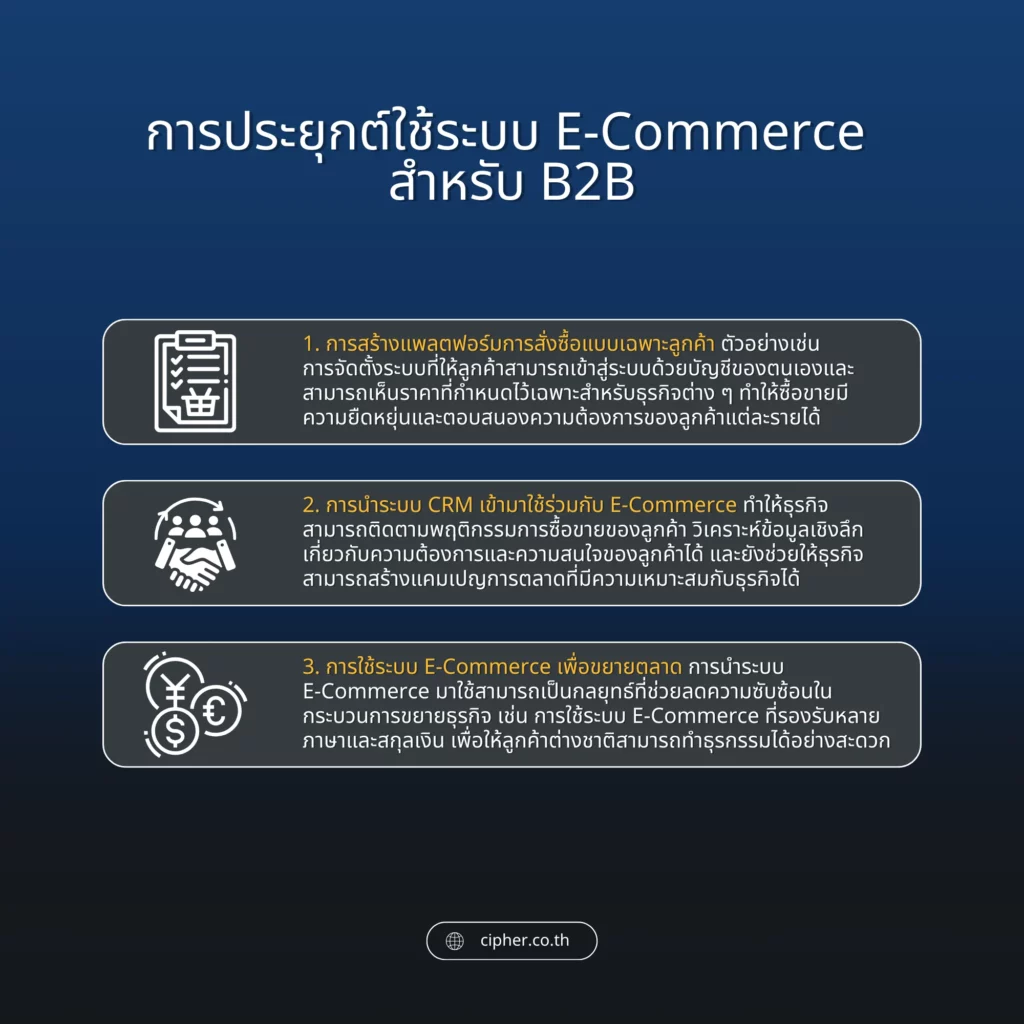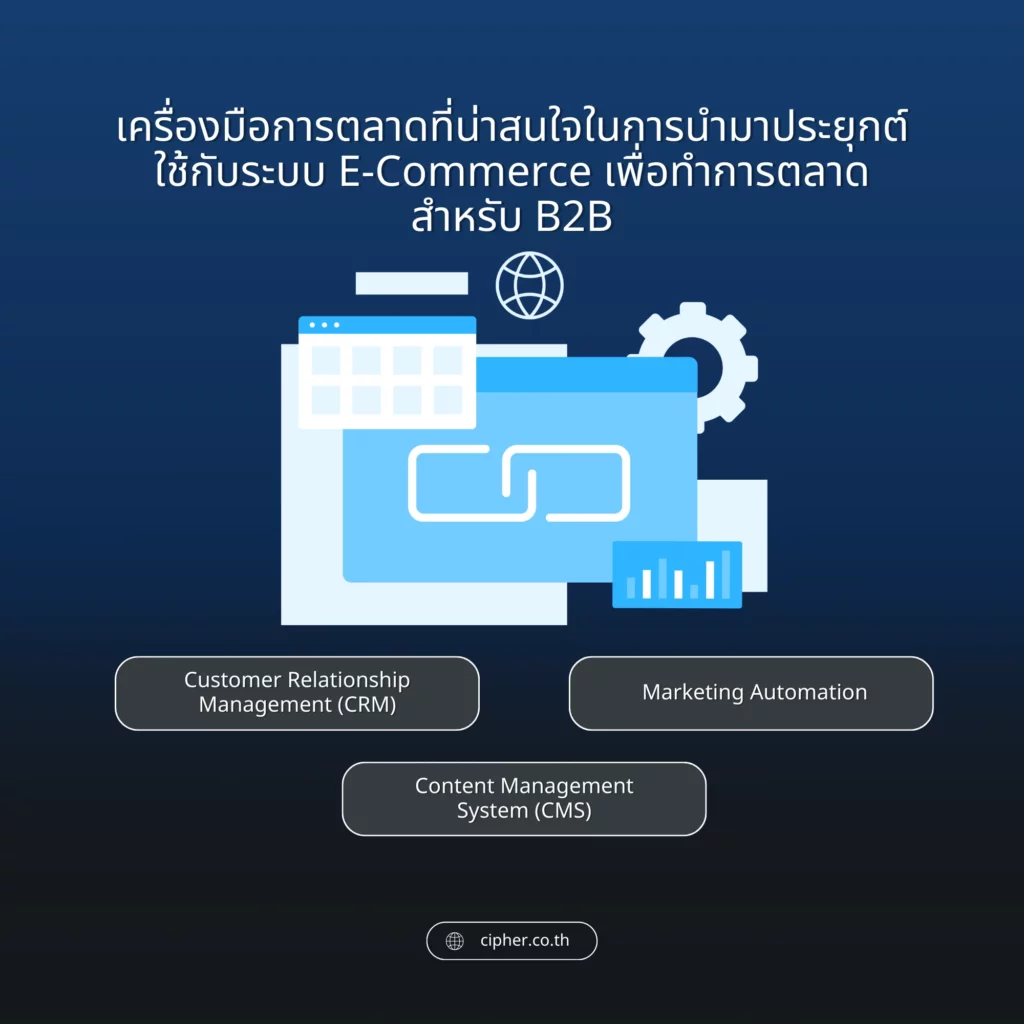Table of Contents
Application of E-Commerce systems to create marketing strategies for B2B businesses
Ever wonder? Why do some businesses succeed in doing B2B business online so quickly? B2B businesses today apply e-commerce tools to their B2B marketing strategies, making it easy to close deals with large customers online. In this article, we will explore techniques and applications of e-commerce to help B2B businesses grow and succeed quickly.
E-Commerce Highlights for B2B
First of all, we should understand how the B2B business differs from the B2C business. The B2B business is that companies sell products and services to other companies, often involving larger volumes and more complex trading processes. At the same time, buyers in the B2B business tend to specialize in specific needs. Therefore, the application of E-Commerce addresses these requirements, providing the following advantages:

- Fast and convenient order management: E-Commerce makes it easy and fast for businesses to manage orders wherever their customers are, and helps reduce potential mistakes in traditional ways of coordinating them.
- Complete Product Information: E-Commerce enables businesses to deliver detailed product information and updates quickly, whether it’s product details, pricing or inventory. Access to complete and up-to-date information allows buyers to make faster decisions.
- Customer Data Analysis: The implementation of E-Commerce also makes it easier for businesses to track and analyze their buying habits, which can be used to improve marketing strategies and deliver products to better suit their needs.
E-Commerce Application for B2B
The implementation of E-Commerce in B2B marketing strategy involves not only having a website where customers can order products, but also using technology and marketing tools to develop and strengthen customer relationships, many of which can be applied.

1. Creating a customer-specific ordering platform
One of the most popular forms of e-commerce for B2B businesses is the creation of an order platform designed specifically for large customers or specific groups of customers, for example, establishing a system that allows customers to log in with their own accounts and see specific prices for businesses and payment conditions tailored to their previously agreed agreements. In addition, This system provides flexibility in trading and better meeting the needs of individual customers.
2. Integrating CRM with E-Commerce
Customer Relationship Management System (CRM) is another tool to enhance the application of E-Commerce in B2B businesses by connecting data from CRM to E-Commerce platforms, enabling businesses to track customer trading practices, analyze in-depth information about customer needs and interests.
The combination of CRM and E-Commerce not only enables businesses to connect with information or track customer behaviour, but also enables them to create marketing campaigns tailored to the needs of their individual businesses by offering promotions or special offers to each group of customers to increase sales.
3. Using E-Commerce to Expand Markets
For B2B businesses seeking to expand their businesses overseas, the introduction of E-Commerce can reduce complexity in business expansion processes such as multilingual and currency-based E-Commerce for convenient transactions for foreign customers. In addition, there should be a system that handles international transportation and automatic import duties. It also simplifies document management processes and makes trading possible more convenient and faster.
An interesting marketing tool to apply the E-Commerce system to market for B2B.

1. Customer Relationship Management (CRM)
CRM is an important tool for B2B businesses to manage and analyze customer information. The use of CRM combined with E-Commerce enables important customer information such as order information, payment information and trading behavior. CRM also helps to promote specific marketing activities such as creating special offers for potential customers such as HubSpot. In addition, CRM provides marketing intelligence and customer management tools and features that support automation.
2. Marketing Automation
Marketing Automation enables B2B businesses to automate and meet their goals. Using E-Commerce, together with Automation tools, automatically track website visits, automatically track unpaid orders, and reduce time to repeat tasks, making B2B marketing more effective. It also reduces the likelihood of losing customers and generating sales by popular tools such as HubSpot. HubSpot’s features can also be used in marketing to generate more sales.
3. Content Management System (CMS)
CMS, or content management system, enables B2B businesses to efficiently create and manage content on their e-commerce sites. Having relevant and high quality content improves customer confidence and provides SEO visibility. E-commerce platforms include the use of Shopify Implementation Service from the Shopify platform. Plus, a full suite of tools and features, is ideal for businesses that require E-Commerce with a significant built-in CMS to support large enterprise sales and large business operations, enabling efficient business management.
Conclusion
The application of E-Commerce for B2B is not just about creating an online sales channel, but the application of these marketing tools to E-Commerce systems in B2B businesses makes marketing management more efficient.
If you need additional help choosing the right tool for your business or need tips on how to use e-commerce for B2B, consult an e-commerce expert today!





